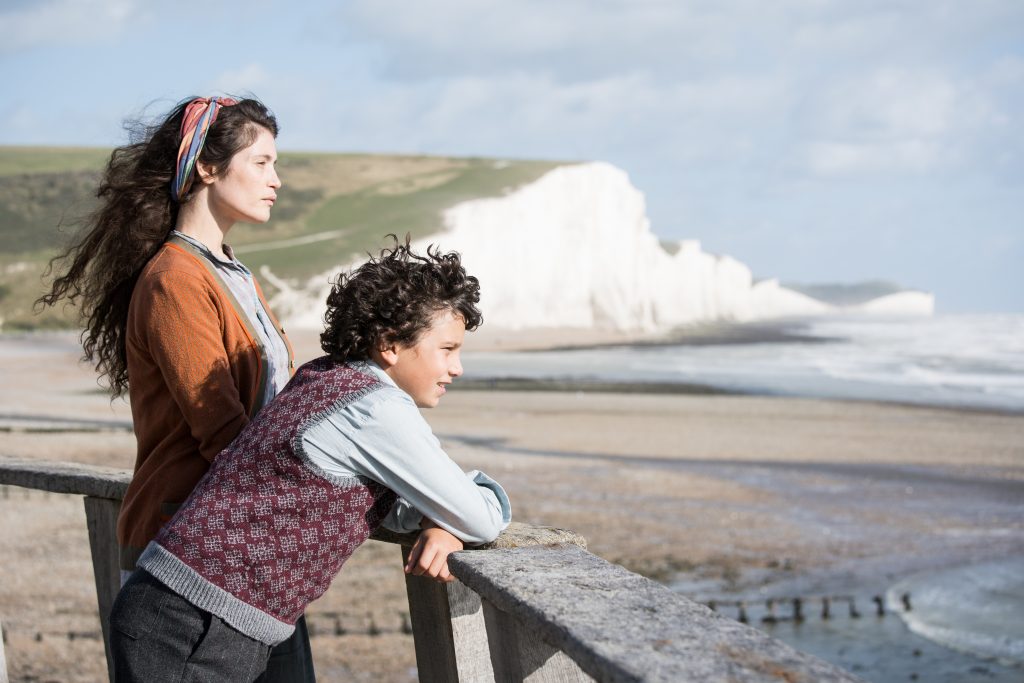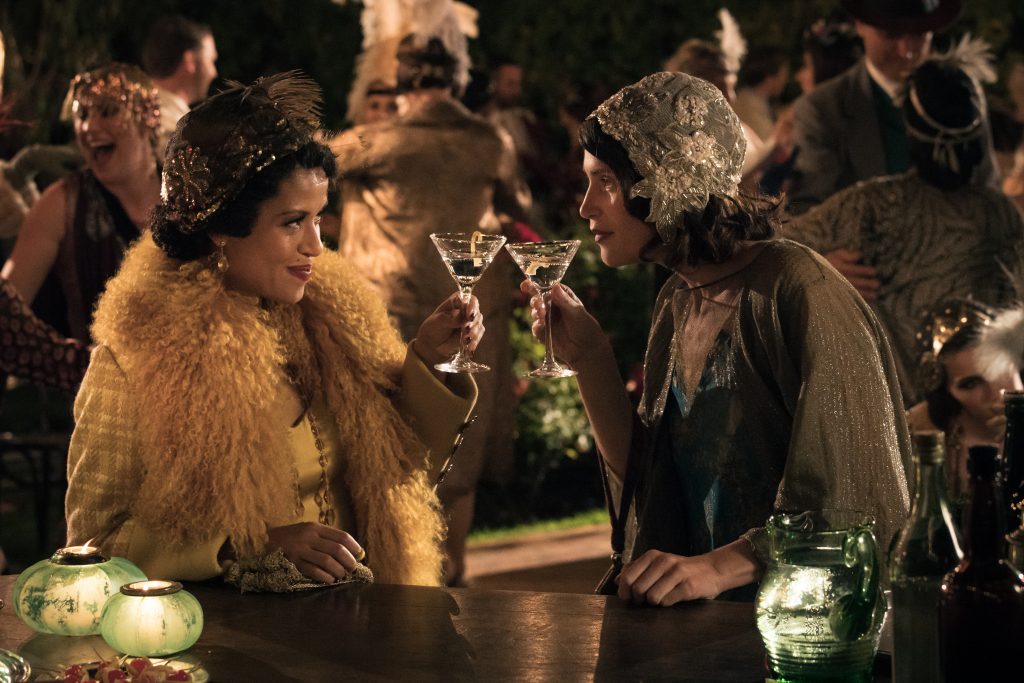August 3, 2020
by Carla Hay

Directed by Jessica Swale
Culture Representation: Taking place in England from the 1920s to 1970s (and primarily during World War II in the early 1940s), the dramatic film “Summerland” has a predominantly white cast (with a few black people) representing the middle-class.
Culture Clash: A reclusive writer who’s a confirmed spinster must battle against prejudices (including her own) about raising a child during World War II, when she’s forced to become a foster parent to an evacuated boy, as she struggles to come to terms with a secret love affair that broke her heart.
Culture Audience: “Summerland” will appeal primarily to people who like period dramas that are about parental issues or LGBTQ issues.

The emotional drama “Summerland,” which is set in England, takes viewers on a journey of someone who never wanted to become parent but is forced to take care of an evacuee boy during World War II. The experience has a profound effect on the child and his foster parent in more ways than one, in a story that has a few big surprises. Written and directed by Jessica Swale, “Summerland” also serves as a reminder of how it’s more important to judge a a family by how they treat each other, rather than by society prejudices of what a family is supposed to look like.
The movie begins in 1975, in a rural beachside area of Kent, where reclusive and cranky writer Alice Lamb (played by Penelope Wilton), who’s in her 70s, is working at home on a book, by using a typewriter. She’s temporarily interrupted by two girls, about 8 or 9 years old, who are at her front door, asking for donations to help the elderly. Alice rudely tells the girls before she slams the door on them, “You know how you can help the aged? You can bugger off!”
Astute viewers will notice that that the two little girls who were at Alice’s door have a strong physical resemblance to two women whose close relationship is revealed later in the story. Seeing these two little girls together appears to have triggered some of Alice’s memories, because most the movie then flashes back to Alice (played by Gemma Arterton) when she was in her early 40s, living in the same house, during World War II.
Alice was a reclusive writer back then too. She has an unpleasant demeanor and a moody reputation. People don’t know if she’s going to ignore them or snap at them. And because Alice is a never-married, childless woman of certain age who lives alone, she is the subject of a lot of the town’s gossip, with some of the townspeople believing that she might be a witch. A few of the residents have given her the unflattering nickname “The Beast of the Beach,” which is what they call Alice behind her back.
It’s revealed later in the story that Alice (who has no siblings) doesn’t seem to have any close family members or friends. Her mother isn’t really mentioned, but Alice’s father played a huge role in her life by encouraging her to follow her dreams. Alice’s father died when she was a child, and Alice was devastated by this loss.
Alice isn’t just a cantankerous eccentric. She seems to go out of her way to insult or hurt people. For example, she goes into a candy shop and sees that a little girl wants to buy some chocolate, but the girl’s mother says no because they can’t afford it, Alice buys the chocolate that the child wants. But instead of generously giving the chocolate to the little girl, Alice keeps the chocolate for herself and smirks outside when she can hear the little girl crying in dismay inside the shop.
It’s made abundantly clear that Alice doesn’t like children. And so, she’s very shocked when a boy in his early teens is placed into her care, despite her protests. The boy’s name is Frank (played by Lucas Bond), he’s an evacuee from London, and Alice is told that she received a letter from the foster-care system saying that she was expected to take care of him. Alice claims she never received the letter.
Alice tries to come up with excuses not take the child into her care, but the foster-care system is overwhelmed, and Alice is told she has no choice to take Frank until they can find another foster home for him. Frank’s father is serving in the military during the war, while his mother is still in London. Frank’s mother sent Frank away for his safety, since London was the target of intense bombing at the time.
During Frank’s first evening at Alice’s house, she treats him in an annoyed and dismissive manner. For dinner, she plops down raw food on a plate and says, “You don’t expect me to cook for you. There’s the stove.” At night, she doesn’t really care if Frank will sleep well, and she doesn’t do anything to make him feel comfortable. When Frank tells her that he usually has a glass of milk before he goes to sleep, Alice ignores him.
Upon his arrival in Kent, Frank is enrolled in a school called St. Nicholas, where the kindly headmaster Mr. Sullivan (played by Tom Courtenay) provides some comic relief to the story because of his sometimes befuddled manner. During Frank’s first class session at the school, teacher Mrs. Bassett (played by Jessica Gunning) tells everyone to be nice to Frank when she introduces him to the students in the class. Mrs. Bassett assigns a seat next to an unfriendly girl named Edie Corey (played by Dixie Egerickx), who treats Frank like an unwelcome outsider.
When Mrs. Bassett says that Frank and Edie have to be class partners, Edie tells Frank, “I don’t believe in partners or sharing. I’m an individualist. I’m a maverick. Mavericks are free thinkers.”
Edie’s personality is basically a lot like Alice’s. And so, later in the movie, when Edie and Alice first meet, they seem to recognize these unpleasant traits in each other and clash later during a crucial part of the story. Edie also has an additional prejudice against Alice because Edie’s grandmother Margot (played by Siân Phillips) is one of the townspeople who thinks that Alice is a witch.
Edie and Alice eventually warm up to Frank, who is an inquisitive and amiable child, although understandably feeling anxious about when he’ll be able to see his parents again. Alice gradually opens up to Frank about her spiritual beliefs (she’s a pagan and an atheist), her interests (writing, reading and looking for mirages) and her love life (she says she loved someone once, but it was a long time ago). Unlike other people, Frank is not judgmental over Alice being a spinster with no children, so she appreciates that he seems to have an open mind.
Alice’s love affair is shown in flashbacks throughout the film. Alice met Vera (played by Gugu Mbatha-Raw), the love of her life, when they were both attending Oxford University in the 1920s. They had an instant connection and become close very quickly.
Vera and Alice also lived together, but they kept their romance a secret because homosexuality was considered very taboo in that time and place. And so, Alice and Vera pretended to the world that they were platonic roommates. However, Vera and Alice had very different visions of their future.
Alice was more inclined to want to live openly as a lesbian couple, while Vera was still very much closeted. What ultimately drove them apart was Vera’s desire to become a mother, which Vera said was more important to her than anything else—even more important than her relationship with Alice. It’s for this reason that Vera broke up with Alice and walked out of Alice’s life.
This heartbreak puts into better context why Alice is so embittered about love and seems repulsed by the idea of taking care of a child. But as Alice and Frank get to know each other, they both realize that they’ve grown more attached to each other than they thought they would be. And they start to learn that being a good parent doesn’t mean that you have to be heterosexual and married.
When Frank and Alice start to talk about heaven, Alice tells Frank that “heaven was made up to make Christians feel better.” She says that if heaven were real, what about the people who died before Christianity existed? “Where did their souls go?” she asks Frank, who can’t answer the question. Alice tells Frank that does sort of believe in a celestial place called Summerland, which she describes as a “pagan heaven” that isn’t based on religion but a peaceful state of mind.
And one day, when Frank discovers an old music album of Alice’s and asks if they can play the album, she snaps angrily at him and tells him now. She says the album was a gift from a female friend she used to have. Based on her emotionally raw reaction, Frank can tell that this album has brought back some painful memories.
Frank astutely guesses that the album was a gift from the “past love” Alice told him about on another day. When Alice asks Frank, “Do you think it’s strange if a woman loved another woman?” When Frank says no, Alice bursts into tears at his unconditional acceptance.
Alice then tells him that most people think that same-sex love is wicked: “They think it’s a sin and we should burn in hell.” Frank replies, “It’s not as bad as marrying someone you don’t like.” And then it’s Alice’s turn to correctly guess something about Frank’s life: Frank’s parents do not have a happy marriage.
“Summerland” doesn’t clutter the story with a lot of unnecessary characters. The movie shows Alice and Frank’s relationship evolving in ways that are sometimes sweet, sometimes uncomfortable, but emotionally realistic, for the most part. Arterton’s Alice is the center of the movie, which she carries quite well, because the actress understands that it’s not about making Alice likeable but making her believable.
As foster child Frank, Bond does a very good acting job, since Frank is the person who gets Alice to take a hard look at herself and face some of the issues that she’s been hiding underneath her gruff exterior. Frank also learns some harsh lessons about life during his time with Alice. “Summerland” has some moments that blatantly pull at people’s heartstrings, but if people look beyond the film’s sappy moments, there’s an impactful message about being open to change and finding love in unexpected places.
IFC Films released “Summerland” in select U.S. cinemas and on digital and VOD on July 31, 2020.
